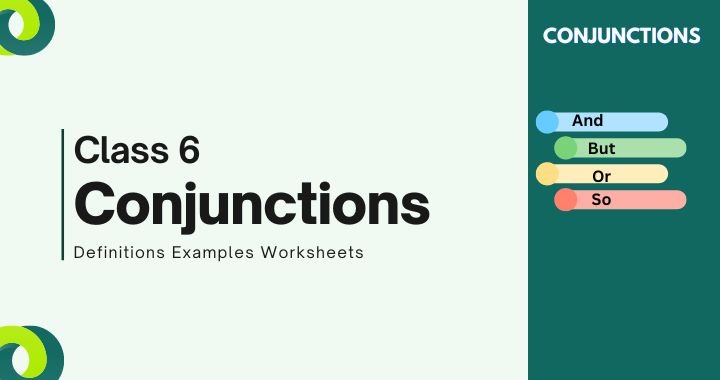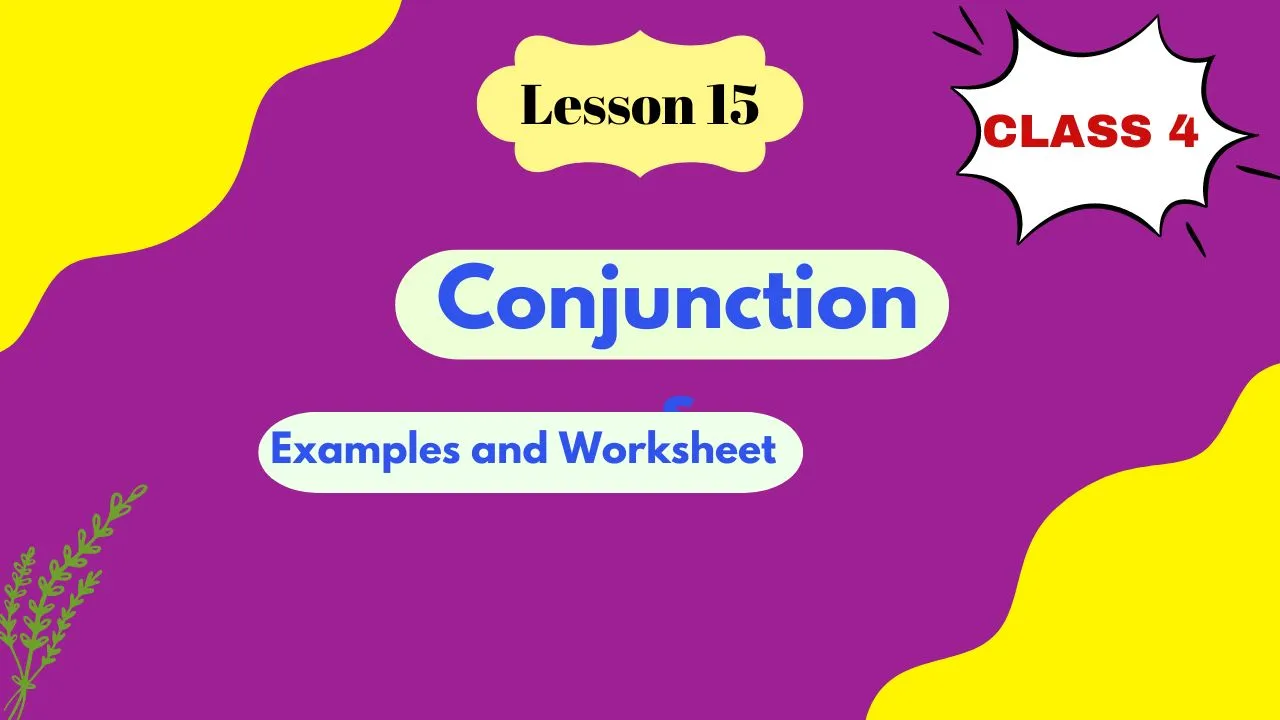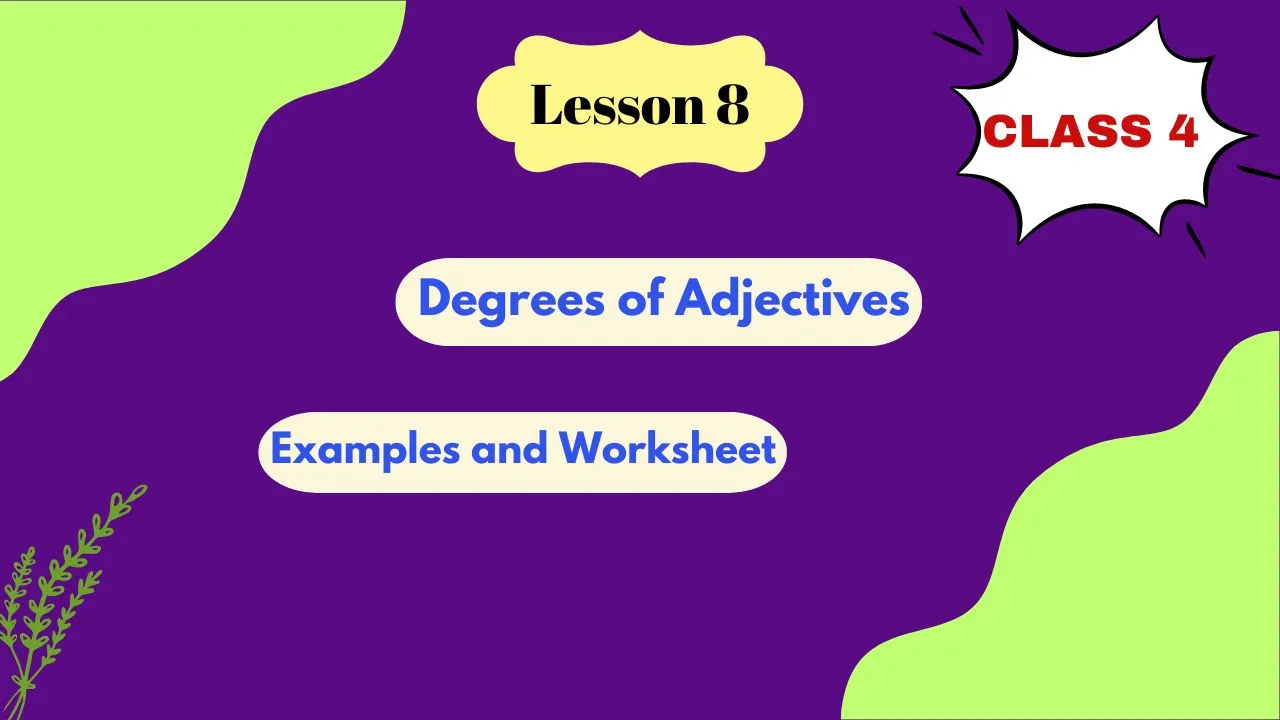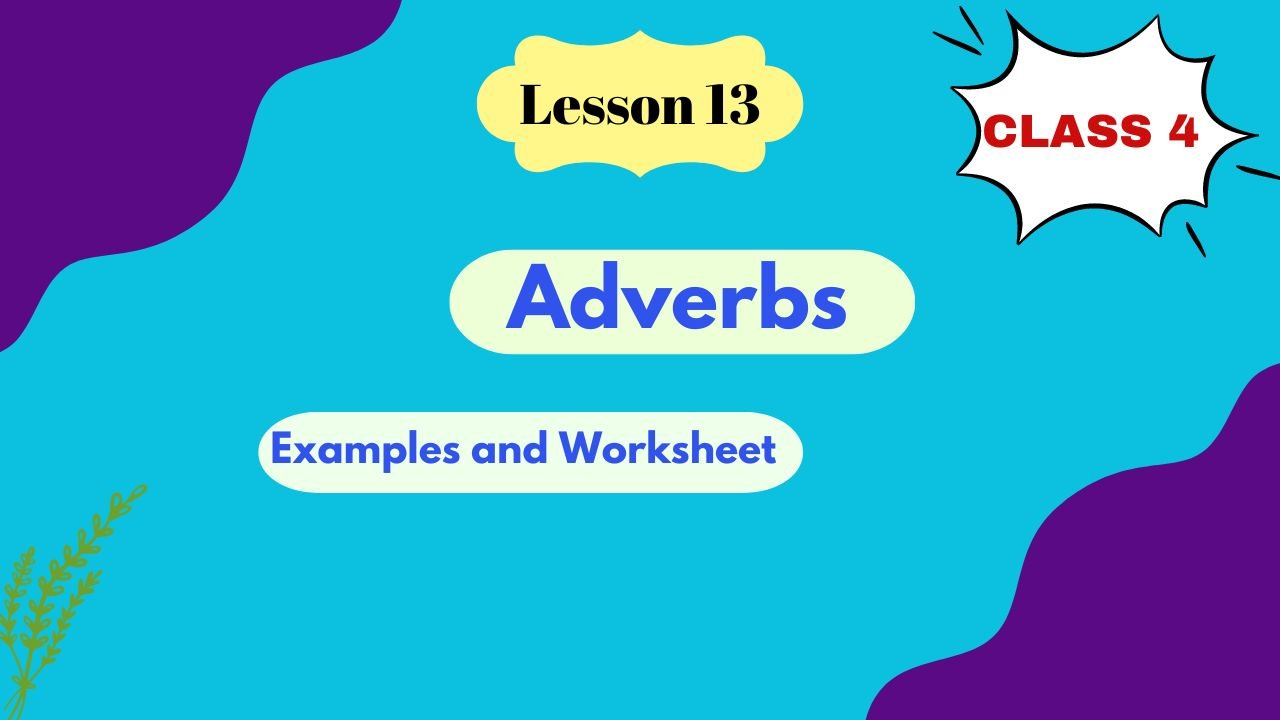Discover the significance of Class 6 Conjunctions Definitions Examples Worksheets in enhancing English skills. Conjunctions connect words, phrases, and clauses to form coherent sentences.
In this comprehensive guide, we delve into the different types of conjunctions, and their usage, and practice with engaging worksheets.
Understanding Conjunctions for Class 6
Understanding conjunctions is fundamental to mastering language skills, as they play a pivotal role in linking words, phrases, and clauses within sentences.
Definition of Conjunctions
A conjunction is a word used to join two words, phrases, or sentences together.
For example,
- And: She likes to read, and he enjoys playing sports.
- But: He wanted to go out, but it started raining.
- Or: You can have tea or coffee for breakfast.
- If: If it rains, we’ll stay indoors.
- Because: She stayed home because she was feeling unwell.
- Although: Although it was cold, they went for a walk.
- Either … Or: You can either come with us or stay home.
- Neither …. Nor: Neither the cat nor the dog wanted to go outside.
- Both …. And: She is both intelligent and hardworking.
English Grammar Ebook for Class 6
Kinds of conjunctions for class 6
Conjunctions are classified into various types based on their functions within sentences. There are three kinds of conjunctions.
- Coordinating conjunctions
- Subordinating conjunctions
- Correlative conjunctions
1. Coordinating conjunctions
The coordinating conjunctions are ‘and’, ‘but’, ‘or’, ‘nor’, ‘yet’, ‘for’, and ‘so’. They help to connect two independent clauses which are grammatically equal.
Note: Coordinating conjunctions, often remembered by the acronym FANBOYS
F-for;
A-and;
N-nor;
B-but;
O-or;
Y-yet;
S-so.
Examples of Coordinating Conjunctions with Meaning
Let us learn more about it.
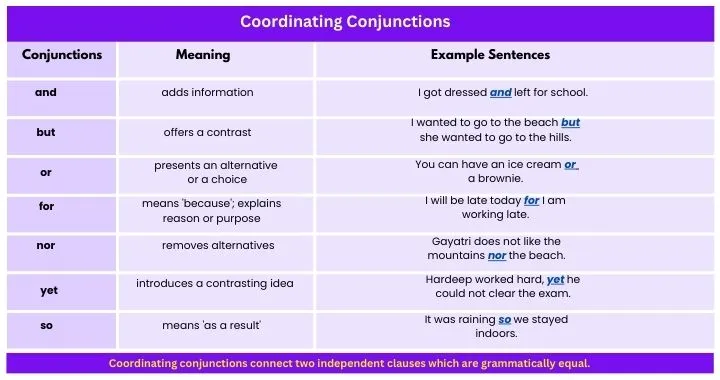
2. Subordinating Conjunctions
The subordinating conjunctions such as after, as, when, until, because, since, so that, while, when, though, although, before, still, till, where, and unless connect clauses of unequal importance – one independent and one dependent clause.
Examples of Subordinating Conjunctions with Meaning
Let us learn more about them.
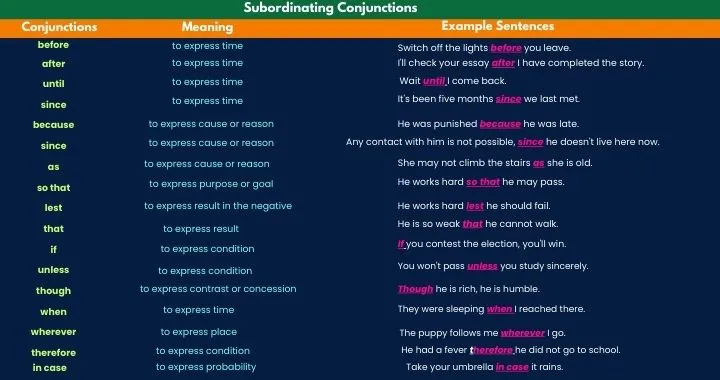
3. Correlative Conjunctions
Correlative conjunctions are pairs of words that always connect two elements that are grammatically similar. In other words, they link nouns to nouns, adjectives to adjectives and phrases to phrases.
For example,
- Neither Rohan nor his friends play video games.
- Rehana is both intelligent and beautiful.
- That man is not only intelligent but also funny.
The common correlative conjunctions are both…and, either…or, neither…nor, not only…but also, whether…or, no sooner…than.
Class 6 English Grammar Chapter-Wise Contents:
3: Nouns
5: Gender
6: Case
7: Pronouns
8: Verbs
10: Adjectives
12: Adverbs
13: The Simple Tense
17: Prepositions
18: Conjunctions
19: Articles
22: Direct and Indirect Speech
Class 6 Conjunctions Worksheets
In this section, you will find a comprehensive collection of Class 6 Conjunctions Definitions Examples Worksheets designed to reinforce the concepts of conjunctions for Class 6 students. These worksheets include engaging examples and practical exercises to enhance understanding and proficiency in using conjunctions.
Worksheets 1:
A. Choose the correct option to complete each sentence.
1. He is young [but/and] he is intelligent.
2. I usually walk to school [but/and] today I went on my bike.
3 I like music [nor/so] I am learning to play the guitar.
4. Work hard [or/so] you will not score good grades.
5. I was tired [so/nor] I went to sleep early.
6. I’m sorry [but/and] I can’t help you.
7. She left [and/nor] I remained behind.
8. He gave me a bright smile [for/and] left the hall.
9. Shall we walk [or/for] go by car?
10. Come here [and/nor] sit beside me.
11. I went to sleep early [for/or] I was very tired.
12. Should we go by bus [or/but] go by train?
13. I invited all my friends [but/and] only a few came.
14. I have a little puppy [and/so] I call it Doodle.
Worksheets 2:
B. Join these sentences to make one complete sentence, without using and, but or or.
1. You are right. I’ll help you.
2. I scored well, He scored better.
3. We ate. We were hungry.
4. He’ll pass. I am sure about it.
5. We love our mother. She loves us.
6. Sonia asked a simple riddle. I was unable to solve it.
7. Hurry up. You’ll be late otherwise.
8. You want to succeed. Work hard.
9. I study seriously. I want to get a first division.
10. You will win the race. You have practised hard.
11. They kept quarrelling. The teacher stopped them.
12. The train came. We had reached the station before.
13. He was hungry. He made some sandwiches for himself.
14. He was afraid of the dog. He didn’t enter the gate.
15. The Chinese built the Great Wall, They wanted to keep out their enemies.
Worksheets 3:
C. Correct the errors in the use of conjunctions in these sentences.
1. Garima is neither polite but funny.
2. My favourite colours are blue because green.
3. Would you like to have tea until coffee?
4. I would have gone to the party and I already have plans.
5. She is not only intelligent and beautiful as well.
6. I got dressed but went to school.
7. She looks scared and she has seen a ghost.
8. You must apologise unless you will be punished.
9. She is very funny because he is boring.
Worksheets 4:
D. Choose the best option to complete each sentence.
1. My little brother can ………. read ……….. wrtte.
a. neither…nor b. either…or c. whether…or
2. This food is ………. appetising ………. healthy.
a. not only…but also b. either…or c. whether…or
3. ………. you clean your room ………. you will stay at home this weekend.
a. both…and b. not only…but also c. either…or
4. I found ………. my coursebook ………. my notebook.
a. whether…or b. either…or c. not only…but also
5. I’ll ………. tell you a story ………. read you a poem.
a. either…or b. no sooner…than c. whether…or
6. Her stories are ………. interesting ………. entertaining.
a. whether…or b. either…or c. whether…or
7. ………. you keep out of mischief ………. leave the hall.
a. either…or b. no sooner…than c. not only…but also
8. ………. I finished watering the garden ………. it started raining.
a. whether…or b. no sooner…than c. not only…but also
9. The boy is intelligent and hard-working.
a. either…or b. whether…or c. both…and
10. I do not know ………. they will come today ………. tomorrow.
a. whether…or b. no sooner…than c. either…or

